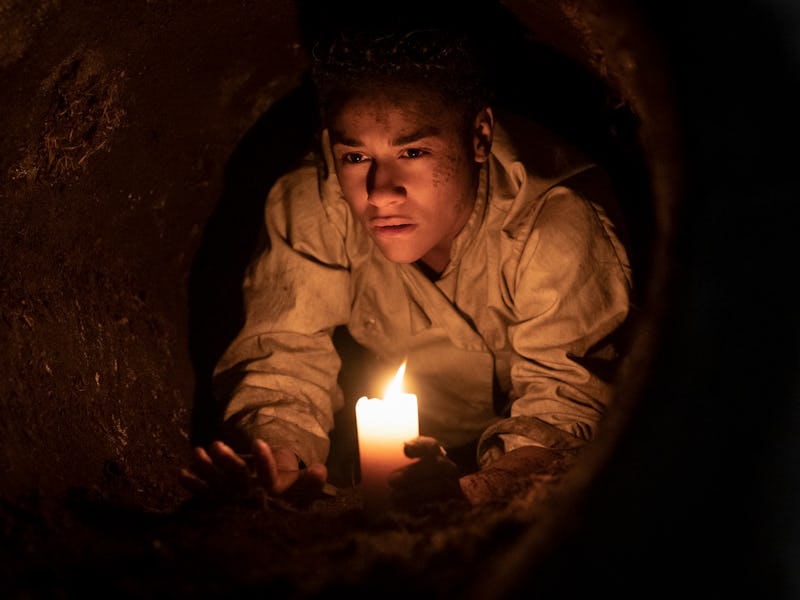House of Spoils Is a Spooky, Squelchy Feast for the Senses
Blumhouse’s dark fairy tale is suitably unsettling, but needs more time to simmer.

Toxic masculinity and the world of fine dining are inextricably linked — at least, that’s the thesis that drives so many culinary thrillers. House of Spoils, the latest offering from Prime Video and Blumhouse, is no different. It shares a few big ideas with cutthroat kitchen dramas like The Menu and (of course) The Bear, but it does well to leave its claustrophobic, spartan kitchen and occasionally play in the dirt. House of Spoils acknowledges that culinary art is — or at least could be — a primal experience. Preparing food and consuming it should connect us to the earth, and even to the divine feminine.
A dark fantasy with a grotesque sense of humor, House of Spoils is at its best when subverting familiar tropes. It’s equal parts The Bear and Hansel & Gretel, a parallel that just barely scratches the surface of this bonkers tale. Bridget Savage Cole and Danielle Krudy (our co-directors and co-writers) create a world teeming with ideas worth chewing on. But its twisty narrative, while promising, ultimately comes out undercooked.
Ariana DeBose is “Chef,” a workaholic with no real name, no personality, and no goal beyond culinary perfection. Like so many chefs before her, her self-worth is tied exclusively to her prowess in the kitchen, and she’s ready to prove her merit by opening a restaurant. Together with a smarmy investor, Andreas (Arian Moayed), our heroine aims to create a new “destination locale” in upstate New York. Ideally, their venture will serve the kind of food that people drive hours for just to taste — earthy, wild, and “feminine,” Andreas unsubtly suggests.
The ivy-covered cottage that serves as their new base of operations (and is definitely not haunted) already has a flourishing garden teeming with mysterious greens. It’d be silly not to take advantage of the bespoke ingredients at their disposal, especially if it gives them the edge against their competitors.
Despite the lure of her new garden, Chef is determined to do things her way. She cleans up the cottage’s rancid kitchen, reluctantly hires a sous chef in Lucia (Barbie Ferreira), and sets out to build the menu. Her progress hits a wall the moment she moves into her new digs, however, as Chef is plagued with nightmares of ghosts and waking visions of bugs crawling all over her food. The dishes that do emerge unscathed are called “bland” and “derivative,” inspiring mild panic from her investor. With only two weeks to get it together, Chef ultimately chooses to embrace her environment and, shockingly, listen to the ghoulish voice in her head telling her to “feed the soil.”
House of Spoils wants to get under your skin — but it may be too ambitious for its own good.
The next two weeks are a whirlwind of culinary creativity. Together with Lucia, Chef plucks produce from the grounds on the estate, crafting a new menu that’s more earthy and wild than Andreas could have ever imagined. She drops the “machismo posturing” she inherited from decades in the service industry and embraces a gentler approach. The house becomes her muse, as does the spirit of the woman who lived there before, tending her garden by dubious means. Rumors of witchcraft and human sacrifice surround the property, but Chef — like any heroine in a horror movie — dismisses it all as hokum. She’s a woman possessed, for better and worse, but hey, anything to get this restaurant up and running.
The allusions to the Brothers Grimm and their visceral fairy tales aren’t subtle. Before long, Chef’s just straight up cooking out of a cauldron. It’s here that House of Spoils feels the most realized and fun, and the most at odds with the stories that have been shoved down our throats of late. Unfortunately, it does still want to be that sort of story at the end of the day, which puts undo pressure on the narrative and its protagonist. As Chef’s grand opening creeps ever closer, her resolve cracks little by little... and so too does the film’s potential.
House of Spoils swings wildly between heightened psychological horror, supernatural fantasy, and grounded realism in its final act. It’s a wild (and fun) ride for the most part. Food stylist Zoe Hegedus deserves plenty of praise for crafting such otherworldly dishes, as does sound designer P.K. Hooker for creating such skin-crawling ASMR. A witchy cautionary tale couched within the world of haute cuisine is a premise that mostly works — but House of Spoils ultimately plays it too safe to push the genre into a new frontier, defanging its boldest ideas before they can land the final blow.